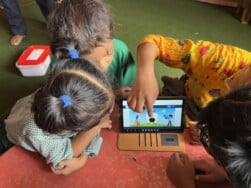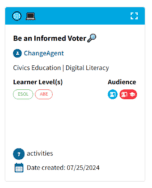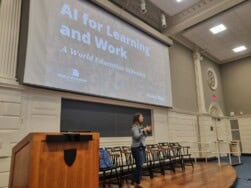Sustainability and Ethics in Digital Transformation
September 3rd, 2024 | Blogs
Rapidly advancing digital technologies have changed the way we can deliver education, inside and outside of the classroom, to prepare learners for an evolving world. Digital technologies can provide tailored learning opportunities for people of all backgrounds, continuously develop teachers’ skills, and build crucial knowledge and skills to tackle future challenges.
We collaborate with governments and communities to adapt digital technologies to local digital demands, leveraging the benefits while addressing disparities in access and mitigating risks. This year, UNESCO’s Digital Learning Week recognizes the importance of maintaining ethical and sustainable development through digital transformation. These examples show the potential of digital learning as long as we build a strong foundation, responsibly navigate emerging technologies, and promote sustainability.
Digital transformation is fundamental to opportunity. It is our job to ensure digital interventions promote equity and meet specific needs by collaborating with local communities to understand barriers and opportunities and working with governments to integrate digital resilience into educational systems.
 At the EdTech Center @ World Education, our mantra is “goals before tools.” This means planning ahead, assessing capacity, and developing strategies, frameworks, and systems that support digital skill development. For example, it means blending high and low tech materials to meet the needs of children with disabilities to reap the benefits of tailored learning while recognizing restricted access to devices and the internet.
At the EdTech Center @ World Education, our mantra is “goals before tools.” This means planning ahead, assessing capacity, and developing strategies, frameworks, and systems that support digital skill development. For example, it means blending high and low tech materials to meet the needs of children with disabilities to reap the benefits of tailored learning while recognizing restricted access to devices and the internet.
Teaching digital skills amidst rapidly evolving technologies requires constant professional development. Developing digital resilience, however, can help all educators and learners to confidently navigate technology with agility. In Cambodia, we’re working with the Ministry of Education, Youth and Sport to create a high-quality, integrated online platform for educators to grow their skills. In Mozambique, we’re using chatbots, WhatsApp peer learning, and an offline Android app with pedagogical content to support teachers.
 In the U.S., we developed the BRIDGES Digital Resilience Toolkit, a comprehensive set of open educational resources that can be used and adapted to support digital literacy development. BRIDGES includes a digital skills framework, along with an aligned library of learning resources and adaptable multimedia glossary, as well as crosswalks to other frameworks to support its flexible implementation. In our free application SkillBlox adult educators in the U.S. locate and then organize instructional resources into a collection of linked digital activities they can share with their learners or other teachers. We’ve also enhanced existing materials, such as our learner-centered The Change Agent magazine, by providing digital instructional materials to the publication and offering articles in SkillBlox.
In the U.S., we developed the BRIDGES Digital Resilience Toolkit, a comprehensive set of open educational resources that can be used and adapted to support digital literacy development. BRIDGES includes a digital skills framework, along with an aligned library of learning resources and adaptable multimedia glossary, as well as crosswalks to other frameworks to support its flexible implementation. In our free application SkillBlox adult educators in the U.S. locate and then organize instructional resources into a collection of linked digital activities they can share with their learners or other teachers. We’ve also enhanced existing materials, such as our learner-centered The Change Agent magazine, by providing digital instructional materials to the publication and offering articles in SkillBlox.
This Digital Learning Week, UNESCO is releasing its Artificial Intelligence (AI) Competency Framework for students and teachers to prepare them to become responsible users and designers of AI in education.
 At World Education, we’ve developed tools to support teachers to use AI in the classroom and to help individuals understand how AI impacts day-to-day life. Our AI Integration Framework outlines the capabilities of AI in meeting learning goals while considering bias, privacy issues, overreliance, and equity. Our AI Literacy Matters brief shows what AI literacy looks like in the real world and its impact on financial literacy, health, workforce readiness, and more.
At World Education, we’ve developed tools to support teachers to use AI in the classroom and to help individuals understand how AI impacts day-to-day life. Our AI Integration Framework outlines the capabilities of AI in meeting learning goals while considering bias, privacy issues, overreliance, and equity. Our AI Literacy Matters brief shows what AI literacy looks like in the real world and its impact on financial literacy, health, workforce readiness, and more.
We’ve also outlined our Three Es for AI for Learning (Equity, Ethics, and Educators) based on our experience working with adult educators in the US to find ways to integrate AI into teaching and with communities in Ghana to help girls practice reading using AI tools. This dives into specific actions we can take to prepare teachers, address ethical concerns, and promote equity.
Digital technologies have the potential to negatively impact our climate and the environment. They can also be a tool for integrating green education and developing the knowledge and skills needed to build climate resilience. We partner with communities to advance transformative approaches to climate and environmental education and apply experiential learning around climate action.
In Benin and Saint Lucia, we’ve engaged young people in action research to center youth voices in decision-making around education, livelihoods, and the environment. Through these activities, youth identified issues that concerned them and designed tools to collect and analyze data to present to key stakeholders. By using digital tools to collect, analyze, and present data, they built their digital skills while promoting climate action.
 Similarly, in Benin, we’ve partnered with communities to use digital tools to collect and record data on local ecosystems to replicate the benefits they provide. The knowledge they gained surveying their environment and adding information to a digital app will help them design agroforestry systems that attract biodiversity and enhance agricultural productivity.
Similarly, in Benin, we’ve partnered with communities to use digital tools to collect and record data on local ecosystems to replicate the benefits they provide. The knowledge they gained surveying their environment and adding information to a digital app will help them design agroforestry systems that attract biodiversity and enhance agricultural productivity.
Navigating sustainability and ethics in digital transformation is an ongoing effort. By developing and sharing open education resources, creating thoughtful frameworks, and designing person-centered digital interventions, we strive to build a strong foundation of knowledge and skills to face the challenges to come.
World Education fosters enduring partnerships across regions and sectors to advance education outcomes for all. We offer education systems strengthening, program design and implementation, applied research and evaluation, capacity development, and policy development services.